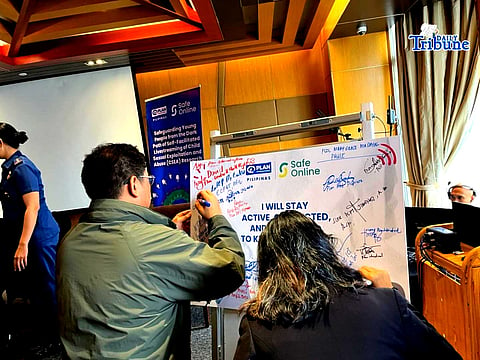
- NEWS
- the EDIT
- COMMENTARY
- BUSINESS
- LIFE
- SHOW
- ACTION
- GLOBAL GOALS
- SNAPS
- DYARYO TIRADA
- MORE

Plan International Philippines has called for stronger involvement from government, the academe, and parents in addressing the alarming rise of self-facilitated livestreaming of child sexual exploitation and abuse (CSEA). The organization is pushing for a “makabata” (child-friendly) digital space.
“The children are not to be blamed,” stressed Sheila Estabillo, Project Manager of the Safe Online Research Project in the Philippines. She emphasized that self-generated sexual content “must not be mistaken for genuine consent or enjoyment.”
Supported by the Safe Online global initiative, the group launched a study combining quantitative and qualitative research gathered from identified hotspots of online sexual abuse and exploitation of children (OSAEC): Angeles, Quezon City, and Manila in Luzon; Leyte and Bohol in the Visayas; and Iligan City in Mindanao.
One 18-year-old respondent shared: “Dapat po unahin po natin sa mga government, sa kanila dapat manggaling ang pagre-respeto sa mga babae. Marami po akong mga na-encounter na mga government na parang walang pakialam sa mga babae.” (We should start with the government; respect for women should come from them. I’ve encountered many government officials who seem to have no concern for women.)
OSAEC — covering grooming, sextortion, livestreaming, and the circulation of child sexual abuse materials was categorized into two types: Commercial is when a child engages in livestreaming sexual content in exchange for money, gifts, or other incentives, and non-commercial is when a child is pressured to livestream sexual content due to emotional manipulation, grooming, peer pressure, or a desire for love, acceptance, or belonging.
The study found that children aged 13–15 are most vulnerable due to naivety and emotional immaturity, while those aged 16–17 are often coerced by financial pressures. Young girls are the most frequent targets.
Beyond economic hardship, cultural factors such as the normalization of relationships with foreigners (the “AFAM” culture) also encourage exploitation. Low digital literacy worsens the problem. Lead researcher Danella Bianca Bona explained: “It is not disinformation, but more of a lack of information that puts children in this situation.”
Bribery and transactions have also become easier. Potential abusers can now send money via GCash or Smart Padala, even if a child does not own an e-wallet, since they can simply withdraw through retail partners.
OIC Executive Director of National Coordination Center Against OSAEC and CSEAM told DAILY TRIBUNE that with the presence of the RA11940 or the Anti-OSAEC Law, the number of people being held accountable are already increasing, but still far compared to the number of victims as certain abuse significantly causes shame, guilt, trauma, and long-term distress. "So ito yung panahon na pwede tayong maging 'marites' (this is the time we need to engage)," she said highlighting the need for sense of community among parents and peers.
Plan International Pilipinas Executive Director Pebbles Sanchez-Ogang told DAILY TRIBUNE that the organization has “an ongoing project with local government units to strengthen referral systems and interventions, such as counseling, psychosocial services, and education and awareness campaigns.”
The study’s recommendations include:
For children: talk to parents or trusted adults about online activities, and browse only age-appropriate websites and apps.
For parents/families: use parental controls, provide emotional support, and foster a stable home environment.
For communities: offer safe spaces for children’s learning and expression, and promote offline activities like sports and arts.
For the private sector/civil society: invest in technology to detect and block abuse content, and support campaigns, training, and awareness programs.
“To truly protect children, we must confront the deeper problems that make them vulnerable in the first place,” Sanchez-Ogang concluded.
